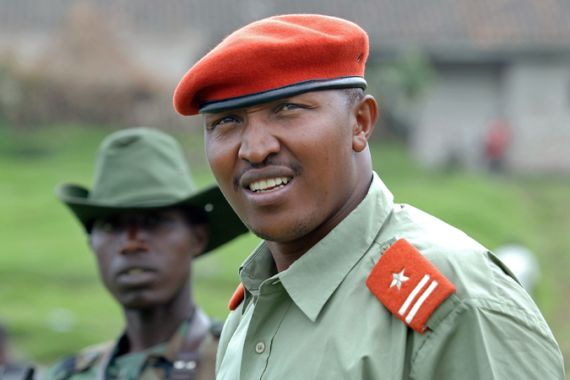ICC issues warrants for DR Congo warlords
Bosco Ntaganda, leader of the M23 rebels, and Rwandan Sylvestre Mudacumura are both wanted for war crimes.

The International Criminal Court has issued arrest warrants against a Congolese and a Rwandan rebel leader accused of committing war crimes and fuelling instability in the eastern Democratic Republic of Congo.
The court announced on Friday that it had issued a warrant against Sylvestre Mudacumura, a Rwandan Hutu rebel leader based in the DR Congo, as well as a fresh arrest warrant against Bosco Ntaganda, a prominent Tutsi Congolese general nicknamed the “Terminator” who has allegedly led an ongoing mutiny in the east.
The DR Congo and the United Nations accuses Rwanda of providing funds, weapons and troops to the rebel group tied to Ntaganda, called M23, which has recently swept through several towns in the east.
The court said Ntaganda is suspected of committing war crimes and crimes against humanity in North and South Kivu in eastern DR Congo between 2002 and 2003.
The court had already issued a warrant against him in 2006 for recruiting child soldiers but in May added new charges.
‘Press-ganging children’
Congolese President Joseph Kabila dismissed calls for his arrest under the first ICC warrant, until recently, arguing that Ntaganda’s co-operation was essential to keeping the peace in Congo’s troubled east. UN peacekeepers in DR Congo who should have been arresting Ntaganda were instead forced to work with soldiers under his command.
The ICC’s Pre-Trial Chamber II said that Ntaganda bore responsibility for three counts of crimes against humanity and four of war crimes, including murder, rape and sexual slavery, persecution and pillaging.
Ntaganda was born in Rwanda and fought in the Rwandan Patriotic Forces, led by current President Paul Kagame, which ended the 1994 genocide by Hutu extremists against Rwanda’s Tutsi minority.
Experts say Ntaganda, who had been integrated into the DR Congo army along with the previous incarnation of his Tutsi rebel group as part of a 2009 peace deal, defected in April when the government moved his unit away from lucrative mines.
A report by United Nations experts has said there is overwhelming evidence of Rwanda’s active involvement in the M23 mutiny, a charge the Rwandan government denies.
In May, Human Rights Watch accused Ntaganda of again press-ganging children for the M23 rebellion. The New York-based group charged that Ntaganda had forcibly recruited at least 149 boys and young men in the first month of the rebellion.
The UN and regional leaders have urged the Congolese and Rwandan presidents to sit down and reach a deal preventing further escalation in war-scarred North Kivu, where recent fighting between the Congolese army and M23 has displaced tens of thousands of people.
Plotting ‘terror attacks’
Mudacumura, the 58-year-old Hutu rebel leader, is wanted for nine counts of war crimes allegedly committed between 2009 and 2010 in the Kivus, including attacking civilians, murder, mutilation, cruel treatment, rape, torture, destruction of property, pillaging and outrages against personal dignity, the ICC said.
The court had turned down the first request for a warrant against Mudacumura in May.
The rebel is believed to be the top military commander of the Democratic Forces for the Liberation of Rwanda (FDLR) and is based in the DR Congo. Kigali has long accused its neighbour of not doing enough to flush out the FDLR rebels, some of whom carried out massacres during the 1994 genocide.
Earlier this month, Kigali accused Kinshasa of resuming active co-operation with Mudacumura’s group and planning “terror attacks” against Rwanda.
Amid calls for Kagame and his Congolese counterpart to discuss a solution to the crisis on the sidelines of this weekend’s African Union summit in Addis Ababa, both sides welcomed the ICC’s move.
Kinshasa said the warrant against Mudacumura was “very good news”.
“We had been hoping for this arrest warrant for a very long time because Mudacumura has done a lot of damage among our population in the Kivus,” government spokesman Lambert Mende said.
Rwanda’s reaction was more guarded.
“Better late than never,” Justice Minister Tharcisse Karugarama told the AFP news agency, adding that the UN mission in the DR Congo and the army there had “always treated him like a pal, a colleague”.